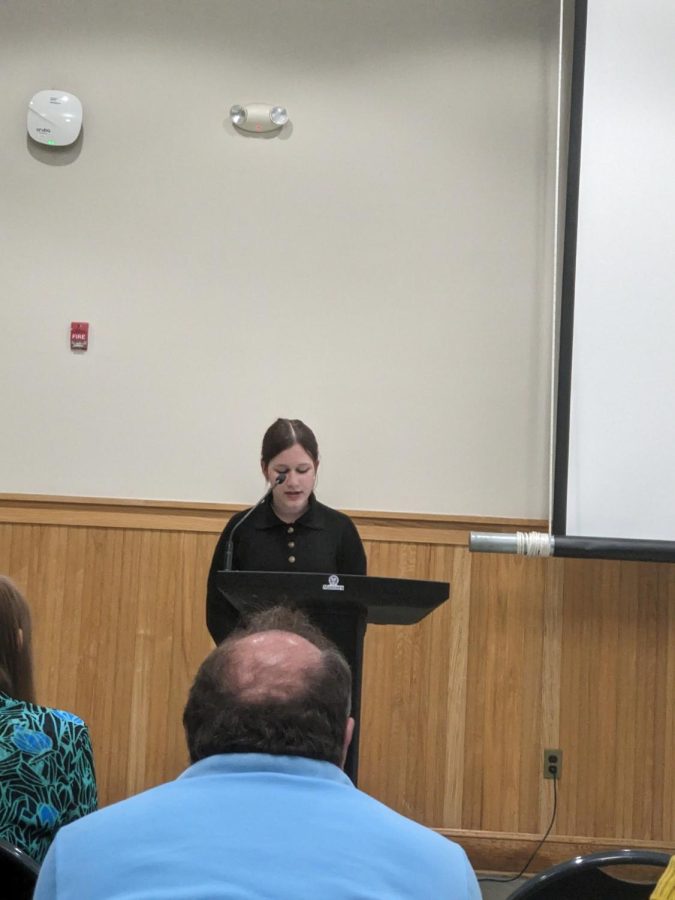Masters hosts a gathering of poets and poetry enjoyers
Freshman Margo Pilic-Steinhauer reads at this year’s Westchester County Poetry Festival. She is also a member of Outspoken.
May 26, 2023
The phrase “to gather” is in The Masters School’s mission statement, and on April 29 a group of poets and poetry enthusiasts did just that in the 12th annual Westchester County Poetry Festival. Those who attended got to hear readings from student poets including Westchester County’s two Youth Poet Laureates: Masters’ own Alexa Murphy ‘24, as well as Harmony Hopwood, who attends New Rochelle High School.
In addition to the students, numerous published poets such as Tina Cane, Katie Farris, Farnaz Fatemi, Ilya Kaminsky and Jennifer Franklin read their work. Ilya Kaminsky, whose book Deaf Republic has been required reading in Masters’ tenth grade English classes for two years now, was particularly interesting to the student audience. Perhaps inspired by Kaminsky’s own experience growing up in what was once the Soviet Union (now Ukraine) as well as his experience being hard of hearing, Deaf Republic is the story of an occupied country whose citizens become deaf from the gunshot of a soldier killing a young boy and coordinate their dissent via sign language.
The festival was originally the brainchild of Masters’ former academic dean Chris Goulian as well as its former librarian Judy Murphy, and it has been going on for 12 years now, in partnership with The Masters School and the Hudson Valley Writers Center. One of the published poets who read at this year’s festival, Jennifer Franklin, is also a member of the Hudson Valley Writers Center and helped to organize this event. Franklin has been writing poetry since she was 15 years old, having started as a coping mechanism to deal with the loss of her favorite teacher, the adviser of her school paper. She said, “Although I had always read a lot of poetry, I only started writing poetry after his death. It’s partially a cathartic experience, and partially it’s an elegy to honor people who have left my life through death or other ways, or to try and understand what I’m feeling and thinking better.”
The poems that Franklin read at the festival were from her most recent book, “If Some God Shakes Your House.” The book is about a modern Antigone, except instead of burying her brother despite the orders from Creon not to do so, this version of Antigone is a mother, caring for her disabled daughter even though the rest of society is telling her not to. This is based on Franklin’s own experience with her daughter who, as a result of her severe autism and epilepsy, essentially has the cognition of a toddler and will never be able to live alone or to take care of herself. Franklin said, “The poems are a way of using the Antigone myth to talk about that devotion and that moral duty.” The book consists of three types of poems: ones from the perspective of Antigone; political prose poems which were about life in America during the Trump administration and the decrease in women’s autonomy; and sonnets which were about art or animals or literature that inspired Franklin.
Franklin has spoken at Masters twice before, in 2019 and in 2012. “This was the best attended,” she said of this year’s poetry festival. “I think that the program structure where established poets read alongside Masters School poets is very inspiring for both the established poets and the student poets. There’s a beautiful exchange that happens in both groups hearing the other. It reminds us what we were like when we were younger poets, and it inspires us to continue writing for our audience.”
Also involved in the planning of the festival was Darren Wood, an Upper School English teacher at Masters. Wood enjoyed the festival, saying, “What I like about the festival is that it’s this temporary community that exists for just the duration of the festival, all these people joining together to appreciate poetry and language.” He continued, “Gatherings, I think, are really special. They’re occasions where strangers come together around a shared interest and love. A lot of folks met each other, or hadn’t seen each other for years, and one of the great things about poems is that when they’re read aloud, you can almost believe that they’re being written in that moment and being delivered as if for the first time. There’s something really dynamic about reading poetry.”
A version of this story initially ran in the Hudson Independent newspaper.



